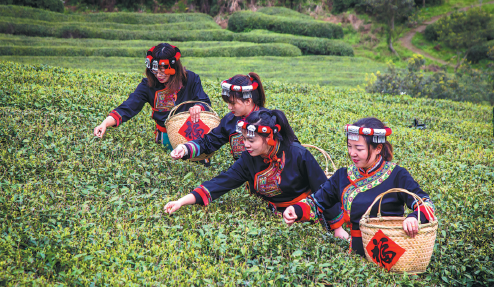Add:1506,Tower West,Jinrun International Plaza,No.85 East Nanxijiang Street,Jianye District,Nanjing,China,210019
Tel: 025-58866358
025-58933315
Fax:025-58867358
E-mail:info@bonagrain.com
Banks create big data platform, offer GI trademark loans to farmers in Fujian province to boost business.

▲ Workers pick tea leaves during a ceremony to mark the first harvest of the year, which occurs each spring, in Ningde, Fujian province, in March 2022. YANG ENA/FOR CHINA DAILY
Banking institutions in Fujian province have strengthened financial support for local farmers and agricultural businesses through innovative methods of lending as they strive for rural vitalization.
Rural credit unions and commercial banks in Quanzhou, Fujian province, are issuing geographical indication, or GI, trademark pledge financing to authorized trademark users amid explorations of turning intangible resources into tangible assets.
Yongchun county in Fujian has more than 667 hectares of Narcissus oolong tea gardens, with a total production capacity exceeding 1,500 metric tons per year. In 2009, Narcissus oolong tea from Yongchun was awarded the national geographical indication trademark.
The history of Narcissus oolong tea can be traced back to the Qing Dynasty (1644-1911). As the legend goes, a farmer named Zheng Shibao and his son went to Fujian to make a living. In 1857, they introduced 100 Narcissus oolong tea seedlings from Wuyi Mountain to Xixi village in Yongchun, where they produced tea with a yellow hue, fragrant taste and smooth and sweet aftertaste. This type of tea was later widely introduced to southern Fujian.
Zheng Shengyan, who has been growing Narcissus oolong tea for many years, is an authorized user of the GI trademark. In order to expand his business, he applied for a loan of 200,000 yuan ($28,992) from Yongchun Rural Credit Union's branch in Huyang township, using the GI trademark as a pledged asset.
The Huyang branch of Yongchun Rural Credit Union accepted his application and offered him a loan with a preferential interest rate.
"I have never thought that geographical indication trademarks could be used for a loan application. With the money, I plan to further expand the planting area, purchase more tea-making machines and produce more Narcissus oolong tea," Zheng said.
In the past, many farmers authorized to use GI trademarks were unable to obtain bank loans due to insufficient collateral, long agricultural production cycles, poor risk resistance ability and low profits. They could only raise funds through family, friends or private lending channels at higher costs.
Things have changed since the local government and banking institutions in Quanzhou started promoting the transformation of agricultural resources with regional characteristics into trademark brand advantages, in order to activate rural production factors and facilitate the internal circulation of the rural economy, said Fujian Rural Credit Union's Quanzhou branch.
The Quanzhou Administration for Market Regulation and the Quanzhou branch of Fujian Rural Credit Union have encouraged local banking institutions to provide loans to authorized users of GI trademarks based on the pledge of trademark rights by the registrants.
The administration provided a list of GI trademark owners and authorized users and specified the conditions for handling GI trademark pledge financing.
Relying on a comprehensive information system for rural vitalization, rural credit unions and rural commercial banks in Quanzhou have located the authorized users of GI trademarks on a grid map, automatically pushed them to corresponding account managers for visits and offered customized lending solutions to meet their financing needs.
The credit limit can reach up to 2 million yuan and the interest rate is capped at 100 basis points higher than the one-year loan prime rate, the benchmark lending rate of China's central bank.
Any authorized user of a GI trademark registered in Quanzhou, with the agreement of the trademark owner, can pledge the trademark as collateral for a loan.
The local government has lowered borrowing costs for authorized users of GI trademarks by giving interest subsidies to those who make regular and timely repayments. In addition, guarantee and appraisal fees are subsidized at 0.5 percent of the loan amount.
Currently, there are 54 GI trademarks in Quanzhou, covering over 100,000 farmers and small businesses, and involving various agricultural and sideline products with regional characteristics. This has promoted the development of many agricultural and sideline industries in counties and county-level cities of Quanzhou, such as Tieguanyin oolong tea from Anxi, seaweed from Jinjiang and mandarin oranges from Yongchun, said the Quanzhou branch of Fujian Rural Credit Union.
A risk-sharing mechanism has also been established among several parties to effectively alleviate credit risks in GI trademark pledge financing.
The Quanzhou Administration for Market Regulation and the Quanzhou branch of Fujian Rural Credit Union have jointly issued a notice on the pilot project of risk compensation for GI trademark pledge financing, introducing a risk compensation mechanism for GI trademark pledge financing.
The lending risk is shared by risk compensation funds, Quanzhou SME Financing Guarantee Co, rural credit unions, and appraisal companies in proportions of 40 percent, 35 percent, 20 percent and 5 percent, respectively.
Quanzhou SME Financing Guarantee Co has streamlined the approval process of GI trademark pledge loans. The company confirms the compliance of the guaranteed loan projects and no longer duplicates due diligence, reducing the workload of relevant parties and simplifying the loan application procedures.
It also offers preferential guarantee rates for GI trademark pledge loans to reduce financing costs for customers.
Up to now, rural credit unions and rural commercial banks in Quanzhou have extended a total credit of more than 200 million yuan for 12 GI trademarks. The average annual lending rate is much lower than the interest rates of loans to farmers in general, said Fujian Rural Credit Union's Quanzhou branch.
In Fuding, a county-level city in Fujian province, the white tea industry is a pillar industry of rural vitalization and Fuding white tea is a geographical indication product.
In 2020, tea gardens in Fuding covered an area of approximately 20,000 hectares, with tea production totaling 32,400 tons, of which 25,300 tons was white tea. More than half of the disposable income per capita for local farmers comes from tea.

▲ Covering an area of 10,000 square meters, the world's largest white tea drying yard is situated in Ningde. YANG ENA/FOR CHINA DAILY
In recent years, Fuding Rural Credit Union and the local government have jointly developed the Fuding white tea big data traceability platform, which traces the entire process of white tea production, promotes the standardization of the process and protects the brand value of the tea.
"By using drones to film tea gardens, the platform obtains and verifies information on the area of tea gardens, tea varieties and bush age to determine the yield of each tea farmer per season. The platform has collected business information of about 70,000 tea farmers, brokers and companies and created databases accordingly," said Xie Zhijun, head of the business development department at Fuding Rural Credit Union.
After verifying the tea gardens, information cards are created for each tea farmer. Tea brokers and companies can efficiently identify and collect information on tea leaves by scanning the QR codes on the information cards. Similar information cards are also created for tea companies as well as verified and registered tea brokers.
By the end of 2022, a total of 84,906 white tea traceability information cards had been issued.
Through collaboration with the provincial rural credit union, Fuding Rural Credit Union has developed a white tea financial rating system and launched a series of innovative loan products.
Tea garden information loans are unsecured loans issued by Fuding Rural Credit Union through the analysis of data available on the Fuding white tea big data traceability platform.
Loans are offered based on the area of tea gardens held by a farmer and their income from tea cultivation. The maximum loan amount is 200,000 yuan.
As of the end of 2022, 1,725 information loans had been issued, with a balance of 131.59 million yuan.
Fuding Rural Credit Union also offers a tailor-made loan product with a maximum amount of 500,000 yuan to tea brokers based on their trading records on the platform.
During the tea season, when the leaves are being put on the market, brokers have an extremely active daily cash flow and often face a shortage of working capital.
At the end of last year, the balance of loans extended to tea brokers reached 213.88 million yuan.
In addition, the lender has actively explored new models to activate rural production factors for tea companies and distributors.
It has launched a white tea warehouse receipt pledge loan business, providing loans of up to 2 million yuan per borrower to tea companies and merchants who hold white tea inventory.
Furthermore, Fuding Rural Credit Union has also allowed tea companies that meet the loan eligibility requirements to pledge their plant operating and possession rights in the form of a contract to Fuding Rural Production Factors Financing Platform based on the trading records of the Fuding white tea big data traceability system, in exchange for a loan.
The lender has effectively solved the long-standing problem of tea companies' inability to apply for loans by pledging their plant assets.
Currently, 54 tea companies have benefited from this new rural production financing model, with a total loan balance of 66.08 million yuan.
记者:江雪晴


